Gummy vitamins are enticing because they taste like candy. However, bariatric patients should avoid taking gummy vitamins after surgery for various reasons. Let’s review the benefits of taking vitamins and supplements, common nutritional deficiencies, and the potential risks of taking gummy vitamins after bariatric surgery.
Benefits of Taking Vitamins and Mineral Supplements
There are several benefits of supplementing your diet with vitamins and minerals, especially for post-bariatric surgery patients. Some benefits include:
- Ensure getting enough proper nutrients
- Improve brain and cognitive function
- Promote healthy hair, skin, and nails
- Boost your immune system
- Develop strong teeth and bones
- Improve heart and nervous system function
- Prevent nutritional deficiencies (for post-bariatric patients)
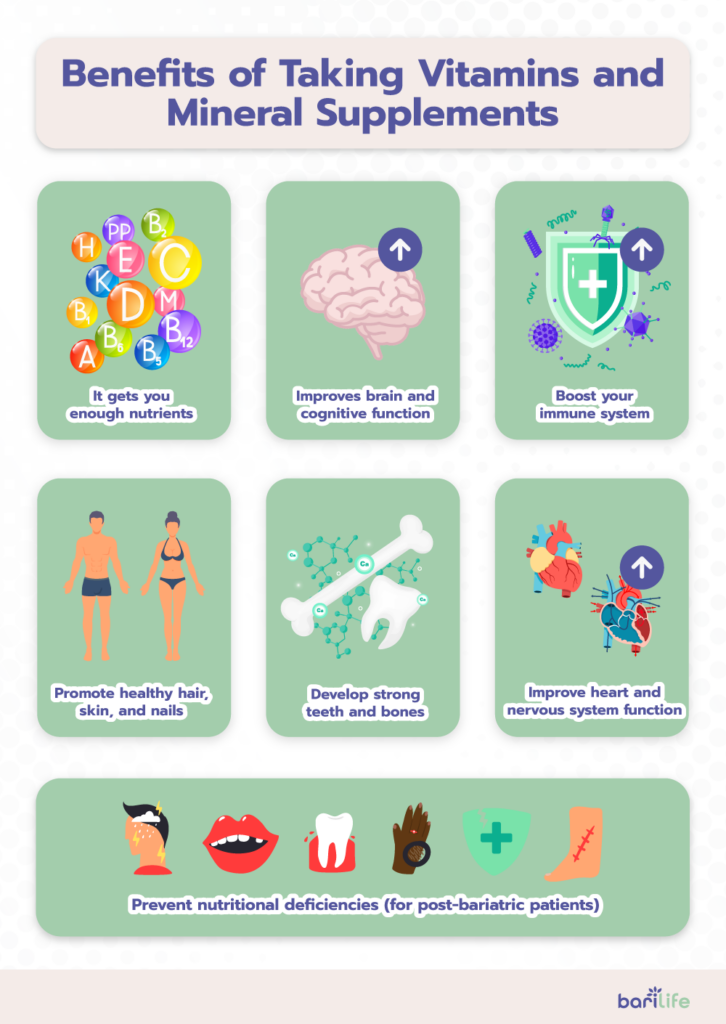
Common Nutritional Deficiencies After Bariatric Surgery
Since bariatric surgery alters your gastrointestinal (digestive) tract, nutritional deficiencies are common after bariatric surgery. This is because most of your nutrient absorption occurs through your body’s digestive tract. First, let’s review the recommended supplementation after bariatric surgery.
Below is a table of daily supplement recommendations for post-bariatric surgery patients.
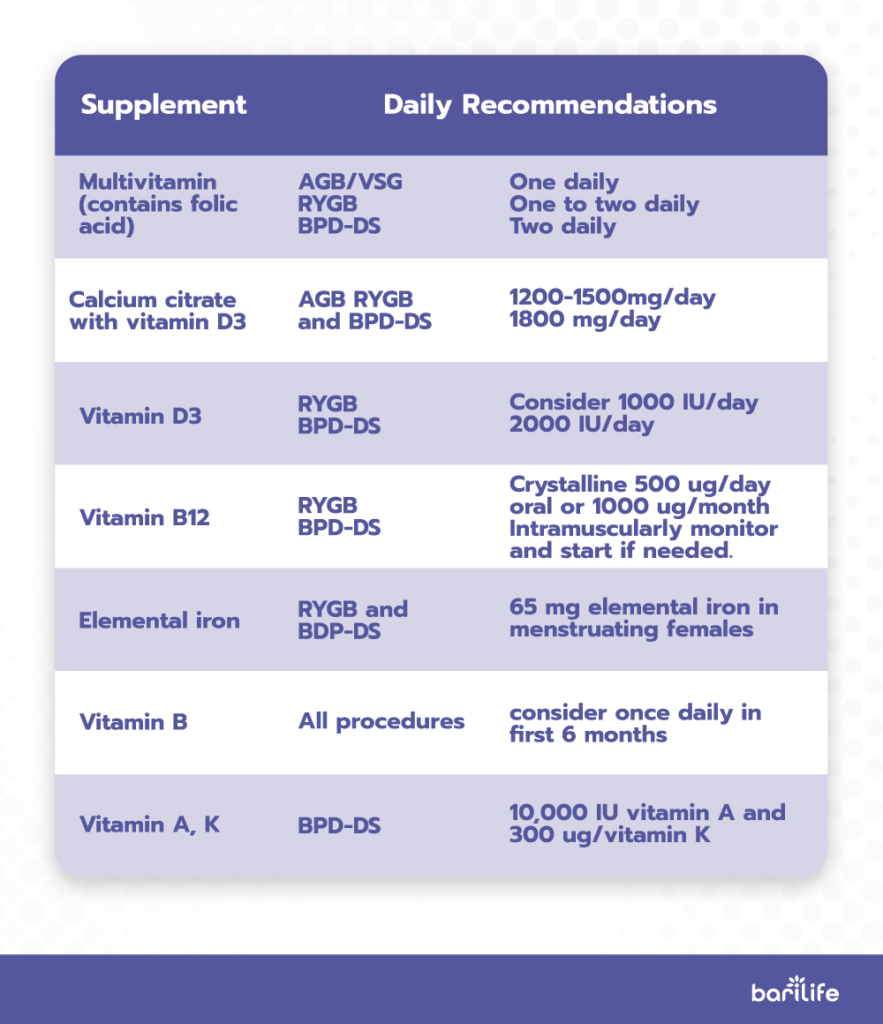
*Recommend in most cases that routine supplementation begin at discharge from hospital so that the patient develops a routine early. The author’s program begins a multi-vitamin supplement and B complex pre-operatively during preparatory weight-management phase in all patients, and adds 1000 IU vitamin D3, if pre-operative vitamin D deficiency is found. Key: RBC: red blood cell TIBC: total iron binding capacity 25 (OH) D: 25 hydroxy-vitamin D PTH: parathyroid hormone AGB: adjustable gastric band VSG: vertical sleeve gastrectomy RYGB: Roux-en-Y gastric bypass BPD-DS: biliopancreatic diversion with duodenal switch
Information from: Xanthakos SA. Nutritional deficiencies in obesity and after bariatric surgery. Pediatr Clin North Am. 2009 Oct;56(5):1105-21. doi: 10.1016/j.pcl.2009.07.002. PMID: 19931066; PMCID: PMC2784422.
As can you see from the table above, post-bariatric surgery patients often need higher amounts of vitamins. Supplementation also depends on the type of procedure you had.
Next, let’s review some common nutritional deficiencies after bariatric surgery.
- Iron Deficiency Anemia. Iron deficiency anemia occurs when your body has an insufficient amount of iron. Without iron, your body will struggle to produce hemoglobin. Hemoglobin is a substance on red blood cells that carries oxygen throughout the body. Many people who have iron deficiency anemia will experience symptoms such as extreme fatigue, headache, dizziness, or weakness.
- Vitamin B12 Deficiency. Vitamin B12 deficiency occurs when you do not have enough vitamin B12. Your body uses vitamin B12 to produce healthy red blood cells, white blood cells, and platelets. Symptoms often include tingling in the extremities, mental changes, diarrhea, and many more.
- Folic Acid Deficiency. Folic acid, also called folate or vitamin B9, is a vitamin that also helps your body produce red blood cells. Folic acid deficiency can cause symptoms like mouth sores, shortness of breath, or difficulty concentrating. It can also lead to long-term complications if not treated properly.
- Calcium Deficiency. Calcium deficiency or hypocalcemia occurs in approximately 3.5% of patients post-bariatric surgery. It contributes to bone density loss, which can lead to osteoporosis.
- Vitamin D Deficiency. Vitamin D deficiency can lead to bone loss and problems with your muscles. Vitamin D is an important component of your musculoskeletal and immune system health.
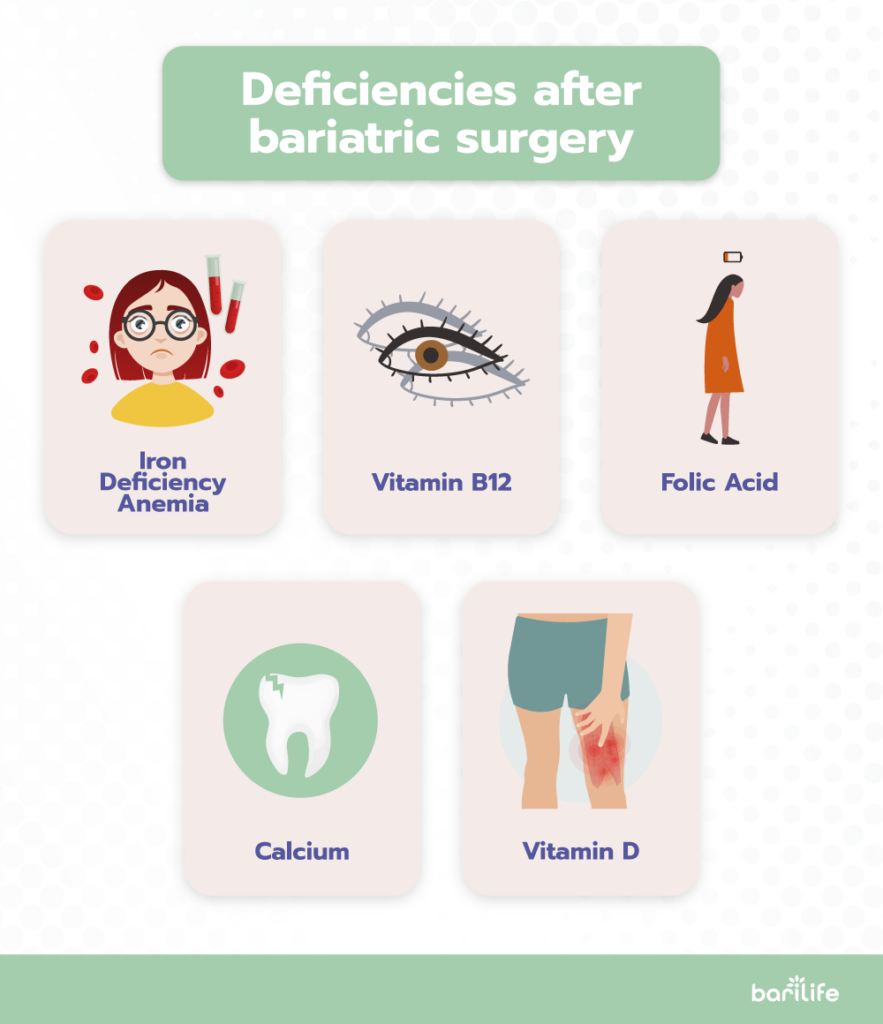
Potential Risks of Gummy Vitamins
Now that we’ve reviewed the common deficiencies and recommended daily amounts, let’s discuss the potential risks of gummy vitamins. Also, we will review why no gummy vitamins after bariatric surgery are allowed.
Gummy Vitamins Do Not Contain Daily Requirements
Gummy vitamins do not contain all of the vitamins and minerals your body requires daily. In addition, in ConsumerLab’s review of multivitamin content, they found that 4 out of 5 multivitamins have more or fewer amounts of vitamins than disclosed.
Gummy Bioequivalence is Not the Same
Bioequivalence compares different forms or active ingredients of a substance to see if they produce the same effect on the body. For example, vitamin supplementation and absorption via tablets or powders if often greater than in gummy form. This is due to how the body breaks down and absorbs nutrients and vitamins. It takes longer for the body to break down gummy vitamins than those in powder form.
Let’s compare some of the nutritional amounts of one of the top gummy multivitamin brands to BariLife’s Complete Formula in the table below.
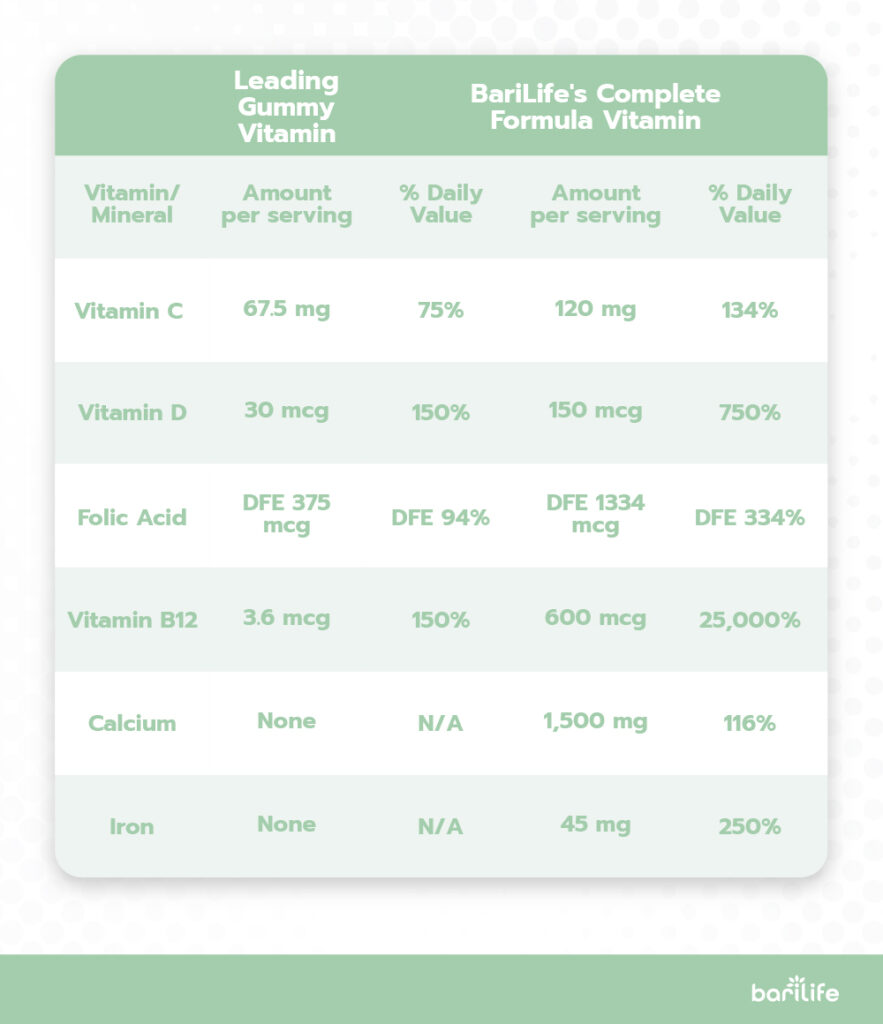
As you can see from the table above, BariLife offers higher amounts of essential vitamins and minerals. They even contain calcium and iron, which the leading gummy brand does not include.
Gummy Vitamins Have Higher Sugar Content
Gummy vitamins also have higher sugar and sugar alcohol content than other vitamin forms, such as powders, chewable, or tablets. Consuming vitamins with higher sugar alcohol content can lead to a variety of gastrointestinal symptoms. Some symptoms include gastrointestinal upset, diarrhea, or irritable bowel syndrome (IBS) like symptoms.
Consuming added sugars increases your risk of developing chronic health conditions as well. Some conditions include diabetes, obesity, and cardiovascular disease. The American Heart Association recommends that men consume no more than 36 grams and women consume no more than 25 grams of added sugar a day. Most gummy vitamins have an average of 8 grams of sugar per serving. This is a lot of sugar content for just taking vitamins and leaves little to no room for other foods during the day.
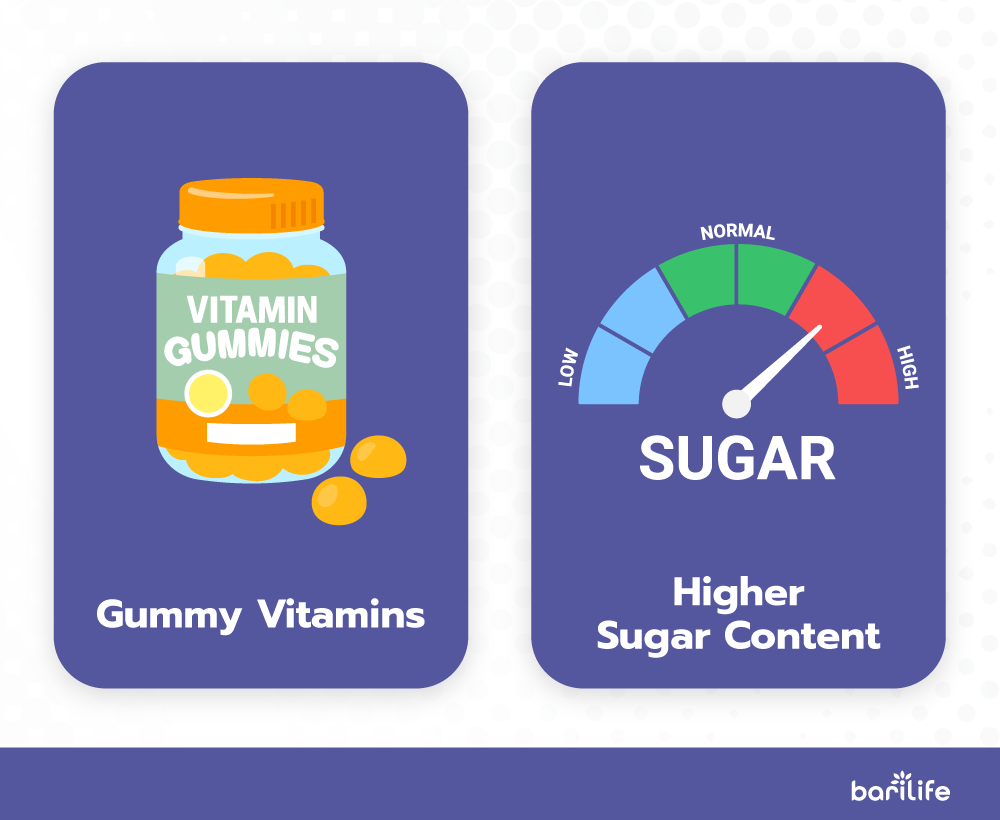
Next Steps
Let’s discuss the next steps to take for selecting the proper vitamins and supplements post-bariatric surgery.
Read the Labels
As we mentioned above, different vitamin brands contain different vitamins and percentage daily value per serving. Always read the labels before making a purchase. Be sure to review that the supplement contains all or most of the vitamins and minerals that your surgeon recommends. This will help you from taking too many pills and having to keep track of several pills you’ve taken each day.
Bring the Bottles with You to Your Appointment
Purchase your vitamins and supplements before surgery, so you can bring them to your appointment with your surgeon. Your surgeon can help you determine the nutritional content, serving size, recommended daily intake, and any possible interactions.
Sometimes vitamins and supplements interact with other medications or alter their potency. Therefore, your surgeon needs to review and make necessary medication adjustments. If you change brands at any time during your weight loss journey, inform your doctor, and again, bring the bottles to the appointment.
Try BariLife Vitamins
To take the guess out of which vitamins and minerals to purchase, try BariLife. Their vitamins and supplements are specifically designed for post-bariatric surgery patients. They offer a variety of flavors and even come in chewable or powder forms.
Since post-bariatric surgery patients can experience many nutritional deficiencies, it’s important to take vitamins and supplements as recommended by your surgeon. Remember, gummy vitamins are not recommended due to the potential risks. Try BariLife, which offers a variety of flavors and options.
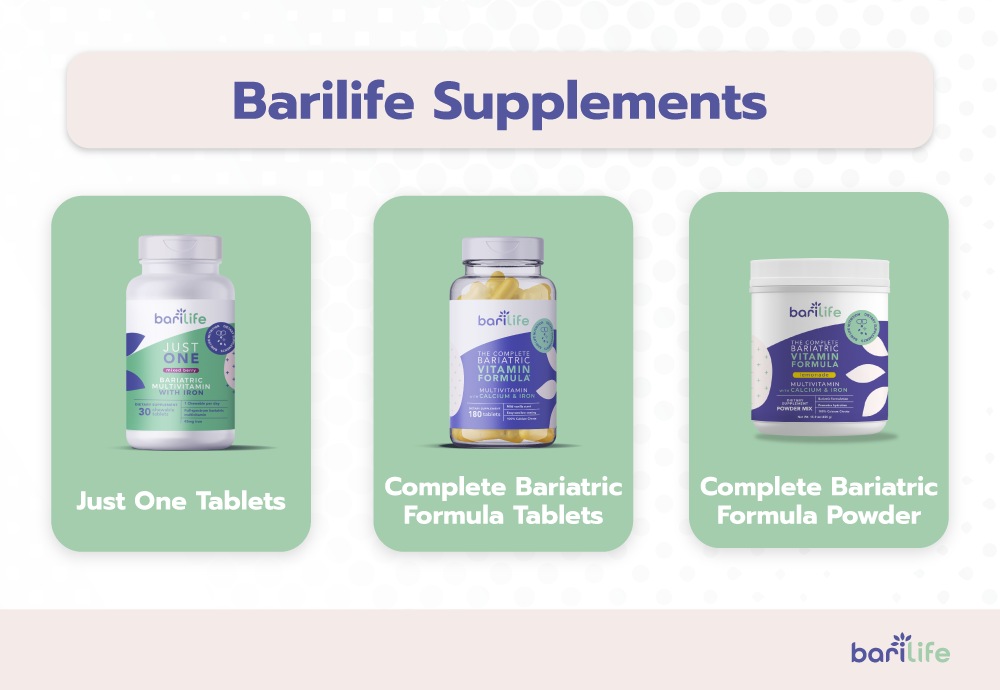




Can someone that has had the duodenal switch take a liquid multivitamin?